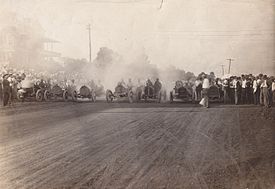Nashville Fairgrounds Speedway

1911 race at Tennessee Fairgrounds
|
|
| Location | Nashville, Tennessee |
|---|---|
| Capacity | 15,000 |
| Owner | Tennessee State Fairgrounds |
| Operator | Tony Formosa, Jr. |
| Broke ground | 1904, 1958 |
| Opened | 1904 |
| Former names |
|
| Oval | |
| Length | 0.596 mi (0.959 km) |
| Turns | 4 |
| Banking |
|
| Oval | |
| Length | 0.25 mi (0.40 km) |
Fairgrounds Speedway is an independent racetrack located at the Tennessee State Fairgrounds near downtown Nashville, Tennessee. The track is the second oldest continually operating track in the United States. The track held NASCAR Grand National/Winston Cup (now Sprint Cup Series) races from 1958 to 1984.
The speedway is currently an 18 degree banked paved oval. The track is 0.596 mi (0.959 km) long. Inside the larger oval is a 1⁄4 mi (0.40 km) paved oval.
The track was converted to a 1⁄2 mi (0.80 km) paved oval in 1957, when it began to be a NASCAR series track. The speedway was lengthened between the 1969 and 1970 seasons. The corners were cut down from 35 degrees to their present 18 degrees in 1972. The track was repaved between the 1995 and 1996 seasons.
The track first featured "horseless carriages" and motorcycles on June 11, 1904, on a 1 1⁄8 mi (1.8 km) dirt oval. Races were canceled after a motorcycle ran into the back of a car that was lining up. Harness horse racing events were also held at the track.
In September 1904 another series of races was organized. Most of the entrants came directly to Nashville from the 1904 World's Fair in St. Louis, Missouri. Racing pioneer Barney Oldfield was one of the entrants. People marveled at cars driving over 60 miles per hour (97 km/h).
The track began holding annual events in September 1915 to coincide with the state fair. Many of the same drivers from the Indianapolis 500 brought their cars down to Nashville.
Local tracks sprang up and began running weekly Saturday night shows (collectively called the "Legion Bowl"), and the local racers competed at the track for the 1954 through 1957 State Fairs. In 1958 car racers decided to build a paved racetrack. The racers ended opposition from horse racers by building a horse track. The racers got a 10-year lease from the state fair board in order to build a paved 1⁄2 mile track which shared the frontstretch with a 1⁄4 mile track. On July 19, 1958, the first race was held at the new speedway. Races were held only on the 1⁄4 mile track (except for special events).
...
Wikipedia
